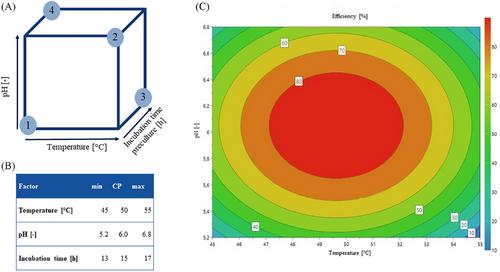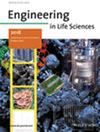Bioprocess development for endospore production by Bacillus coagulans using an optimized chemically defined medium
IF 3
4区 生物学
Q2 BIOTECHNOLOGY & APPLIED MICROBIOLOGY
引用次数: 0
Abstract
Bacillus coagulans is a promising probiotic, because it combines probiotic properties of Lactobacillus and the ability of Bacillus to form endospores. Due to this hybrid relationship, cultivation of this organism is challenging. As the probiotics market continues to grow, there is a new focus on the production of these microorganisms. In this work, a strain‐specific bioprocess for B. coagulans was developed to support growth on one hand and ensure sporulation on the other hand. This circumstance is not trivial, since these two metabolic states are contrary. The developed bioprocess uses a modified chemically defined medium which was further investigated in a one‐factor‐at‐a‐time assay after adaptation. A transfer from the shake flask to the bioreactor was successfully demonstrated in the scope of this work. The investigated process parameters included temperature, agitation and pH‐control. Especially the pH‐control improved the sporulation in the bioreactor when compared to shake flasks. The bioprocess resulted in a sporulation efficiency of 80%–90%. This corresponds to a sevenfold increase in sporulation efficiency due to a transfer to the bioreactor with pH‐control. Additionally, a design of experiment (DoE) was conducted to test the robustness of the bioprocess. This experiment validated the beforementioned sporulation efficiency for the developed bioprocess. Afterwards the bioprocess was then scaled up from a 1 L scale to a 10 L bioreactor scale. A comparable sporulation efficiency of 80% as in the small scale was achieved. The developed bioprocess facilitates the upscaling and application to an industrial scale, and can thus help meet the increasing market for probiotics.

使用优化的化学限定培养基由凝结芽孢杆菌生产内生孢子的生物工艺开发
凝结芽孢杆菌是一种很有前途的益生菌,因为它结合了乳酸杆菌的益生菌特性和芽孢杆菌形成内孔的能力。由于这种杂交关系,这种生物的培养具有挑战性。随着益生菌市场的持续增长,人们对这些微生物的生产有了新的关注。在这项工作中,开发了一种凝结芽孢杆菌的菌株特异性生物工艺,一方面支持生长,另一方面确保孢子形成。这种情况并非微不足道,因为这两种代谢状态是相反的。所开发的生物工艺使用了一种改良的化学定义培养基,在适应后,在一次一因子的测定中对其进行了进一步研究。在这项工作的范围内,成功地证明了从摇瓶到生物反应器的转移。研究的工艺参数包括温度、搅拌和pH控制。特别是与摇瓶相比,pH控制改善了生物反应器中的孢子形成。该生物过程产生了80%-90%的孢子形成效率。这对应于由于转移到具有pH控制的生物反应器而使孢子形成效率增加7倍。此外,还进行了实验设计(DoE),以测试生物过程的稳健性。该实验验证了所开发的生物工艺的先前预测的孢子形成效率。然后将生物过程从1L规模放大到10L生物反应器规模。实现了与小规模中类似的80%的孢子形成效率。所开发的生物工艺有助于扩大规模并应用于工业规模,从而有助于满足日益增长的益生菌市场。
本文章由计算机程序翻译,如有差异,请以英文原文为准。
求助全文
约1分钟内获得全文
求助全文
来源期刊

Engineering in Life Sciences
工程技术-生物工程与应用微生物
CiteScore
6.40
自引率
3.70%
发文量
81
审稿时长
3 months
期刊介绍:
Engineering in Life Sciences (ELS) focuses on engineering principles and innovations in life sciences and biotechnology. Life sciences and biotechnology covered in ELS encompass the use of biomolecules (e.g. proteins/enzymes), cells (microbial, plant and mammalian origins) and biomaterials for biosynthesis, biotransformation, cell-based treatment and bio-based solutions in industrial and pharmaceutical biotechnologies as well as in biomedicine. ELS especially aims to promote interdisciplinary collaborations among biologists, biotechnologists and engineers for quantitative understanding and holistic engineering (design-built-test) of biological parts and processes in the different application areas.
 求助内容:
求助内容: 应助结果提醒方式:
应助结果提醒方式:


